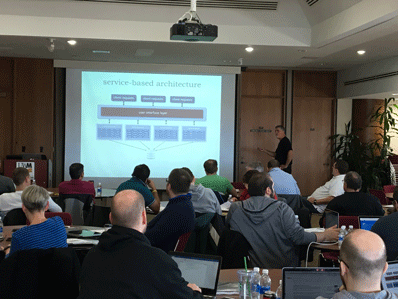
The Center for Technology Innovation sponsors a series of day-long workshops on cutting-edge technology issues with nationally-known speakers.
Workshops are open to the public and offered in-person or online. Workshop pricing are as follows (unless otherwise noted):
A full day, online workshop costs $125.00 (or a discounted rate of $105.00 for UWM MIS/ITM alumni).
A full day, in-person workshop costs $165.00 (or a discounted rate of $145.00 for UWM MIS/ITM alumni).
A half-day workshop costs $65.00 (or a discounted rate of $55.00 for UWM MIS/ITM alumni).
All prices include handouts.
Topics include:
- A survey of what resides in a typical Git repository
- Understanding blobs, trees and commits, and the constitution of Git’s DAG (Directed Acyclic Graph)
- Branches and Tags
- What is HEAD?
- Understanding the reflog
- Using stashes
- Undo with reset and revert
- Merging, and rebasing
- Guidelines for good commit messages and branch names
Recent workshops have included:
- Domain-Driven Design (DDD)
- Gleaning Insights from Operational Time Series Data
- WebAssembly
- Architecting Cloud Native Applications
- Refactoring to Modern JavaScript
- Kubernetes Cloud Native Training
- Enterprise Blockchain
- Cognitive Services & Deep Learning
- Software Architecture Fundamentals
- Build Once, Run Anywhere – with Docker and Dockerfiles
- Hands-On Machine Learning
- Blockchain
To automatically receive information on upcoming workshops, please click here to request being added to our mailing list.
Panels
The Center also sponsors panel discussions with IT leaders who present their thoughts on topics of interest to the local IT community. Audience participation follows the presentation.
Director, Center for Technology Innovation
Assistant Professor, Information Technology Management
Lubar Hall N369
414-251-6758
schanke@uwm.edu